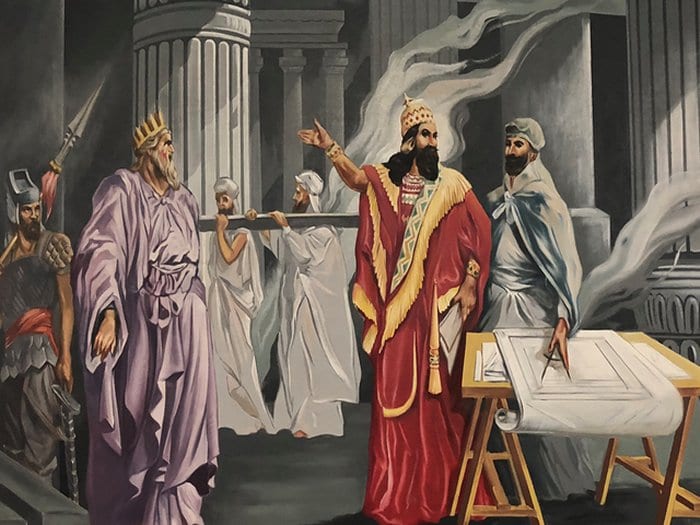I was watching Avraham Gileadi’s, Lecture and Colloquium 6: Awakening to an Awful Sense of Your Situation —Book of Mormon Types of Our Day when I became curious about parity covenants. I feel like we make covenants without fully understanding what we are doing. It has become so routine in religion that we go through the motions, not comprehending the meaning. Too often, we parrot.
I decided to look further into this subject of parity covenants. In another post, I studied salt covenants. I’m looking at parity covenants because Avraham mentioned an example of one used in the school of the prophets in 1833:
And when any shall come in after him, let the teacher arise, and, with uplifted hands to heaven, yea, even directly, salute his brother or brethren with these words:
Art thou a brother or brethren? I salute you in the name of the Lord Jesus Christ, in token or remembrance of the everlasting covenant, in which covenant I receive you to fellowship, in a determination that is fixed, immovable, and unchangeable, to be your friend and brother through the grace of God in the bonds of love, to walk in all the commandments of God blameless, in thanksgiving, forever and ever. Amen. (D&C 88:132-133)
I never recognized that as a parity covenant. But I do now.
The Old Covenant and the New Covenant
It appears that the words “covenant” and “testament” are used interchangeably. So, The Old Testament and The New Testament could be called The Old Covenant and The New Covenant, which may give us some new insight.
We get the word “covenant” from the Hebrew word “bə·rî·ṯî ” (berith), which is translated to”diatheke” in Greek and to “testamentum” in Latin. I use Bible Hub to look up the different translations and how often a word is used. Often in Hebrew, the word berith (covenant) is used with the word karat (to cut) — so you would have “to cut a covenant.”
In that day the LORD made (karat, cut) a covenant with Abram, saying, Unto thy seed have I given this land, from the river of Egypt unto the great river, the river Euphrates (Genesis 15:18)
made:
כָּרַ֧ת (kā·raṯ)
Verb – Qal – Perfect – third person masculine singular
Strong’s Hebrew 3772:1) to cut, cut off, cut down, cut off a body part, cut out, eliminate, kill, cut a covenant 1a) (Qal) 1a1) to cut off 1a1a) to cut off a body part, behead 1a2) to cut down 1a3) to hew 1a4) to cut or make a covenant 1b) (Niphal) 1b1) to be cut off 1b2) to be cut down 1b3) to be chewed 1b4) to be cut off, fail 1c) (Pual) 1c1) to be cut off 1c2) to be cut down 1d) (Hiphil) 1d1) to cut off 1d2) to cut off, destroy 1d3) to cut down, destroy 1d4) to take away 1d5) to permit to perish 1e) (Hophal) cut offa covenant:
בְּרִ֣ית (bə·rîṯ)
Noun – feminine singular
Strong’s Hebrew 1285:1) covenant, alliance, pledge 1a) between men 1a1) treaty, alliance, league (man to man) 1a2) constitution, ordinance (monarch to subjects) 1a3) agreement, pledge (man to man) 1a4) alliance (of friendship) 1a5) alliance (of marriage) 1b) between God and man 1b1) alliance (of friendship) 1b2) covenant (divine ordinance with signs or pledges) 2) (phrases) 2a) covenant making 2b) covenant keeping 2c) covenant violation
There are many references in the scriptures about making (cutting) a covenant — and there are possibilities why this Hebrew word “to cut” refers to covenant-making. But that is another topic. For now, a covenant is an agreement between parties that is legally binding and beneficial to each party. It is usually given with an oath. And often witnesses. Sometimes a meal and a sign.
Parity Covenant
Not all covenants are the same. The parity covenant appears to be one between equals — individuals or groups, or nations. It can be between two kings. But, it cannot be between a mortal and God.
The parity covenant was made between people of approximately equal status. The covenant was normally entered into willingly by both parties. It would be first proposed by one side, and then accepted by the other, before being sealed by an oath and eating a meal together. The two parties normally refer to each other as “brothers”, showing their equality. A parity covenant is only made between two human beings, never between God and his people. (Julian Spriggs)
An example of a parity covenant in the Bible was the covenant between Abraham and Abimelech. Or another example was the one made between King Solomon and King Hiram of Tyre. (1 Kg 5)



